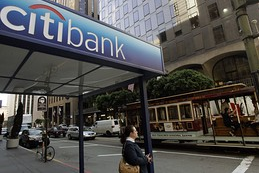Here are a couple articles by Mish, on bank nationalization.
Obama administration tries to end bank nationalization talk
The White House on Friday insisted it’s not trying to take over two ailing financial institutions, even as stocks tumbled again. On Wall Street, talk of nationalization of Citigroup Inc., and Bank of America Corp., prompted investors to continue to balk, worried that the government would have to take control and wipe out shareholders in the process.
Citigroup fell 20 percent, while Bank of America fell 12 percent in afternoon trading but also came off their lowest levels.
"This administration continues to strongly believe that a privately held banking system is the correct way to go, ensuring that they are regulated sufficiently by this government," White House press secretary Robert Gibbs said when asked about nationalizing the banks.
"That’s been our belief for quite some time, and we continue to have that," Gibbs said.
When a reporter suggested Gibbs could do that by saying point bank that Obama would never nationalize banks, Gibbs would not make that statement, but emphasized: "I think I was very clear about the system that this country has and will continue to have."
Bank Nationalization Fears
CNN Money is reporting Bank Nationalization Speculation Prompts Confusion, Fear.
Speculation about possible bank nationalization by the U.S. government is driving down shares in the sector Friday. However, there’s plenty of uncertainty of what nationalization would actually look like.
Nationalization gives the U.S. government the power to control banks. That power could mean anything from taking control of the public shares to replacing existing management, installing a new board of directors and setting corporate strategy. But the lack of clarity surrounding nationalization has created confusion on what’s the best path the federal government should take.
"One of the problems in talking about nationalization is there is very little consensus on what the word means," Yves Smith, author of the popular "naked capitalism" blog, wrote in a recent post. "I strongly suspect that the advocates and opponents may have a lot more common ground than they realize."
There are several questions that need to be addressed before nationalization can seriously be considered, said Michael Shedlock, an investment adviser for Sitka Pacific Capital Management. They include what happens to the government guarantees of bank debt and whether both stockholders and preferred shareholders will be wiped out in a nationalization scenario.
"Unless and until those questions are answered, we cannot know to what extent taxpayers are at risk," Shedlock wrote on his blog.
Citigroup closed at $1.95 trading as low as $1.61. Bank of America closed at $3.79 having traded as low as $2.53.
Regardless of what Obama says, the market doubts these banks survive.
Mish, yesterday:
Nationalization Revisited
Yves Smith at Naked Capitalism discusses this in Greg Mankiw in Favor of Nationalization (and Tries to Clean Up Nomenclature).
One problem I have is that no one is laying out the details of what should happen. Does Mankiw’s nationalization equal Roubini’s or Greenspan’s? Let’s explore that question with a look at Mankiw’s Nationalization, or Pre-privatization?
If the government is to intervene in a big way to fix the banking system, "nationalization" is the wrong word because it suggests the wrong endgame. If banks are as insolvent as some analysts claim, then the goal should be a massive reorganization of these financial institutions. Some might call it nationalization, but more accurately it would be a type of bankruptcy procedure.
Bankruptcy could become, in effect, a massive bank recapitalization. Essentially, the equity holders are told, "Go away, you have been zeroed out." The debt holders are told, "Congratulations, you are the new equity holders." Suddenly, these financial organizations have a lot more equity capital and not a shred of debt! And all done without a penny of taxpayer money!
I am sure there are a host of legal issues here. The government cannot blithely walk into banks and tell them they are insolvent when the banks are saying (pretending? hoping? praying?) otherwise. But as bank regulators, the feds have more leeway with banks than they would with other types of business enterprise. How much leeway is an issue beyond my ken.
Unfortunately, Mankiw does not offer many details other than suggesting equity holders will be wiped out and bond holders get the assets.
Questions That Need Addressing
1. Are all US government guarantees of bank debt null and void? They should be. At a minimum, taxpayers are currently on the hook for $300 billion of Citigroup’s debt and $100 billion of Bank of America’s debt.
2. Are we going to end up creating another banks that is "too big to fail" out of this mess?
3. Will stock holders and preferred shareholders both be wiped out?
4. In a normal bankruptcy process one might expect to see significant changes in management. Will the nationalization process allow the clowns who wrecked these banks to stay in control? For how long? Under what capacity? And what person or committee gets to decide those questions?
5. Will the CDS liabilities be wiped out in entirety regardless of consequences? Clearly they should because otherwise taxpayers will be footing the bill. Unless this is spelled out I suspect measures will be taken to protect Goldman or whoever else is on the right side of those CDS and derivative contracts.
6. What kind of bidding process will be put in place and in what timeframe for the assets of the banks? Who decides and why?
When someone says they are in favor of nationalization, those are the questions that are in play that need to be addressed, for starters. There are likely many other questions that I missed. Unless and until those questions are answered, we cannot know to what extent taxpayers are at risk. I would like to see Nouriel Roubini and Greg Mankiw address those questions, otherwise we may be comparing apples to planets. Without answers to those questions,I strongly suspect taxpayers will be left holding the bag.




